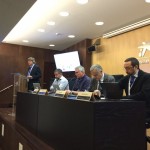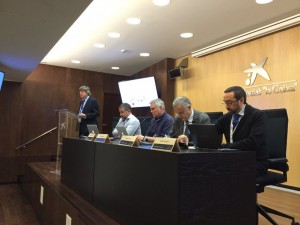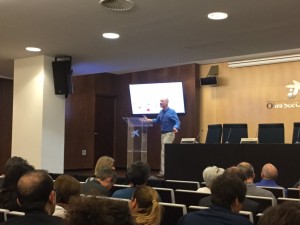Telspain 2015: Building not only a system for eLearning, but an ecosystem to customize

The Spanish Network of Technology Enhanced Learning (Telspain, http://www.telspain.es) has gathered national and international experts in order to analyze the relationship between private sector and universities along with the future of eLearning. UNIR has participated in the congress through the Vice-chancellorship of Research and Technology (UNIR Research, //research.unir.net). One of the main conclusions was the importance to enhance the communication amongst all the stakeholders to improve the actual system.
18th, December 2015. What are the next step of the Technology applied to Education? Are we moving forward to a better integration between formal, informal and non-formal education? To what extent are all the participants on education prepared to the big challenges we are facing? These are only some of the questions that the meeting has tried to answer.
Integration and dialogue
“Nowadays, education is a ship seeking his way”, has highlighted the first Keynote speaker, Marlow Brown, Director of EDUCAUSE Learning Initiative. Professor Brown has pointed out that the LMS (Learning Management System) has to evolve to converge with mobile applications: “like pieces of Lego, we have to integrate the different tools to make available for the students the resources that they need or prefer”.
After the main keynote, participants were divided in three groups analyzing three big topics: future of eLearning, Big Data, and the relationship between companies and educational institutions. UNIR Research has participated in the workshop about Future on eLearning.
“We have to integrate the different tools
to make available for the students
the resources that they need or prefer”
In this workshop, Jeff Merriman, Associate Director of MIT’s Office of Educational Innovation and Technology, has launched a challenging question for learning designers “How can we move to an environment where students and professors can download an app from the university to work with it? How can we create this App store environment and how students and tutors can produce by themselves models and applications to do the system more flexible?”

From the point of view of Charles Severance, Clinical Associate Professor at the University of Michigan School of Information, “as a teacher you need and application elegant, simple, easy to use. We have been punishing the teacher a lot of time, and this have caused also problems with students”. After presenting a number of practical examples he has recognized that “one of my dreams is that each teacher will have an app for mobile available for students”. But this idea face a lot of problems, “the think is: Who is going to give such a flexibility to our teachers?”.
Technology and Education environment
The necessity of sharing information between universities and institutions as data for research has become one of the most polemic subjects in the debate, moderated by Prof. Dr. Daniel Burgos, Vice-chancellor for Research and Technology (UNIR Research, //research.unir.net), UNESCO Chair on eLearning and ICDE Chair in Open Educational Resources.

Juliá Minguillón, Data Scientist and Lecturer at Universitat Oberta de Catalunya (UOC), has highlighted the difficulties encountered with institutions “it will be necessary for the governments to convince themselves of the key importance of this data sharing to improve the Education System”. Miquel Puig said that “the universitary microdata shouldn´t be so troubling, but I won´t bet on a change of policy”. For Dr. Merriman “it is not a technical problem it is a policy problem where security and privacy are involved”.
In the final conference, António Teixeira, President of EDEN (Education Distance and E-Learning Network) has underlined the role of pedagogy. “All the technology environment has to be adapted to pedagogy. Professors and tutors must be trained specifically for this. Technology has been dominating the landscape, but all the stakeholders collaboration is needed nowadays to improve the entire system”.
Author:
Carlos Fernández-Alameda
Science Journalist
UNIR Research UCC+i
